Corporate Social Responsibility: Literature Review and Analysis Report
VerifiedAdded on 2020/11/23
|10
|2814
|167
Report
AI Summary
This report presents a comprehensive literature review on Corporate Social Responsibility (CSR). It begins with an introduction to CSR, defining it as a self-regulating business model that benefits both companies and society through enhanced employee relations, brand recognition, and customer loyalty. The report outlines the purpose and structure of a literature review, emphasizing its role in understanding existing research, identifying gaps, and justifying the need for further investigation. The review then delves into various perspectives on CSR, examining its multidimensional nature, ethical considerations, and impact on financial performance and stakeholder engagement. It highlights the importance of sustainability, accountability, and transparency in CSR practices. The report also discusses the benefits of CSR, including brand recognition, cost savings, and positive societal impacts, concluding with its role in building healthy customer relations and fostering ethical business practices. The report uses a range of scholarly sources to support its arguments.
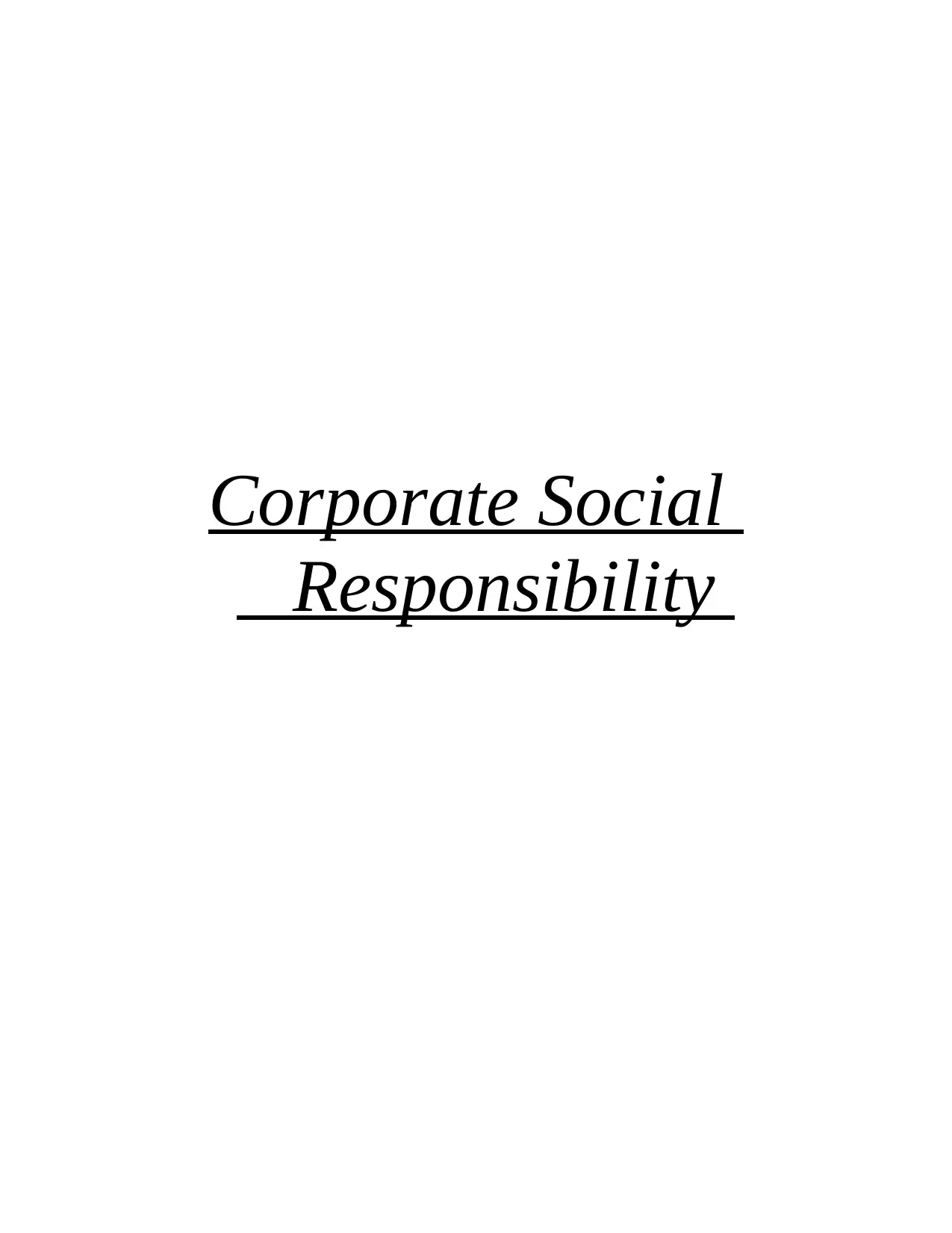
Corporate Social
Responsibility
Responsibility
Paraphrase This Document
Need a fresh take? Get an instant paraphrase of this document with our AI Paraphraser
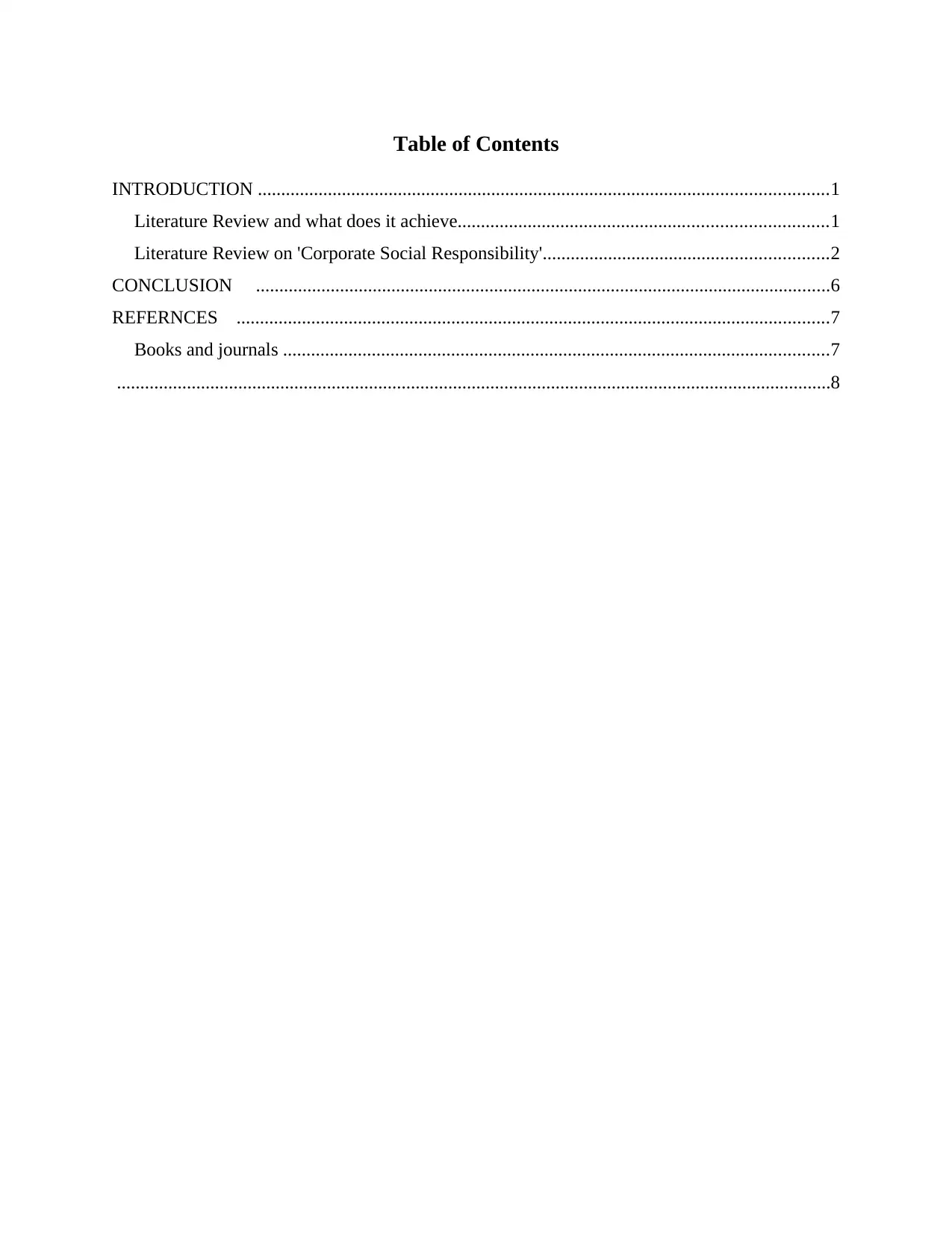
Table of Contents
INTRODUCTION ..........................................................................................................................1
Literature Review and what does it achieve...............................................................................1
Literature Review on 'Corporate Social Responsibility'.............................................................2
CONCLUSION ...........................................................................................................................6
REFERNCES ...............................................................................................................................7
Books and journals .....................................................................................................................7
.........................................................................................................................................................8
INTRODUCTION ..........................................................................................................................1
Literature Review and what does it achieve...............................................................................1
Literature Review on 'Corporate Social Responsibility'.............................................................2
CONCLUSION ...........................................................................................................................6
REFERNCES ...............................................................................................................................7
Books and journals .....................................................................................................................7
.........................................................................................................................................................8
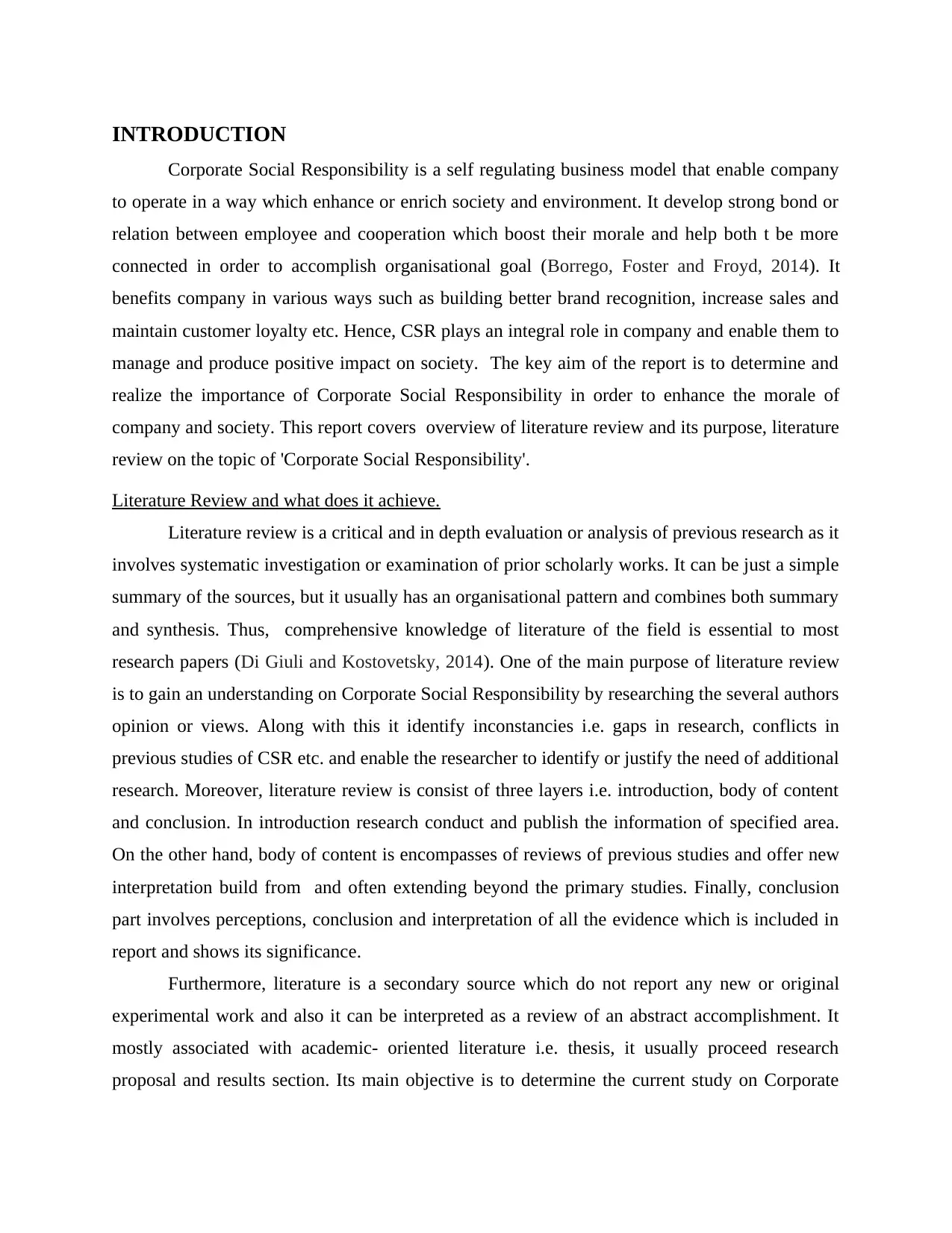
INTRODUCTION
Corporate Social Responsibility is a self regulating business model that enable company
to operate in a way which enhance or enrich society and environment. It develop strong bond or
relation between employee and cooperation which boost their morale and help both t be more
connected in order to accomplish organisational goal (Borrego, Foster and Froyd, 2014). It
benefits company in various ways such as building better brand recognition, increase sales and
maintain customer loyalty etc. Hence, CSR plays an integral role in company and enable them to
manage and produce positive impact on society. The key aim of the report is to determine and
realize the importance of Corporate Social Responsibility in order to enhance the morale of
company and society. This report covers overview of literature review and its purpose, literature
review on the topic of 'Corporate Social Responsibility'.
Literature Review and what does it achieve.
Literature review is a critical and in depth evaluation or analysis of previous research as it
involves systematic investigation or examination of prior scholarly works. It can be just a simple
summary of the sources, but it usually has an organisational pattern and combines both summary
and synthesis. Thus, comprehensive knowledge of literature of the field is essential to most
research papers (Di Giuli and Kostovetsky, 2014). One of the main purpose of literature review
is to gain an understanding on Corporate Social Responsibility by researching the several authors
opinion or views. Along with this it identify inconstancies i.e. gaps in research, conflicts in
previous studies of CSR etc. and enable the researcher to identify or justify the need of additional
research. Moreover, literature review is consist of three layers i.e. introduction, body of content
and conclusion. In introduction research conduct and publish the information of specified area.
On the other hand, body of content is encompasses of reviews of previous studies and offer new
interpretation build from and often extending beyond the primary studies. Finally, conclusion
part involves perceptions, conclusion and interpretation of all the evidence which is included in
report and shows its significance.
Furthermore, literature is a secondary source which do not report any new or original
experimental work and also it can be interpreted as a review of an abstract accomplishment. It
mostly associated with academic- oriented literature i.e. thesis, it usually proceed research
proposal and results section. Its main objective is to determine the current study on Corporate
Corporate Social Responsibility is a self regulating business model that enable company
to operate in a way which enhance or enrich society and environment. It develop strong bond or
relation between employee and cooperation which boost their morale and help both t be more
connected in order to accomplish organisational goal (Borrego, Foster and Froyd, 2014). It
benefits company in various ways such as building better brand recognition, increase sales and
maintain customer loyalty etc. Hence, CSR plays an integral role in company and enable them to
manage and produce positive impact on society. The key aim of the report is to determine and
realize the importance of Corporate Social Responsibility in order to enhance the morale of
company and society. This report covers overview of literature review and its purpose, literature
review on the topic of 'Corporate Social Responsibility'.
Literature Review and what does it achieve.
Literature review is a critical and in depth evaluation or analysis of previous research as it
involves systematic investigation or examination of prior scholarly works. It can be just a simple
summary of the sources, but it usually has an organisational pattern and combines both summary
and synthesis. Thus, comprehensive knowledge of literature of the field is essential to most
research papers (Di Giuli and Kostovetsky, 2014). One of the main purpose of literature review
is to gain an understanding on Corporate Social Responsibility by researching the several authors
opinion or views. Along with this it identify inconstancies i.e. gaps in research, conflicts in
previous studies of CSR etc. and enable the researcher to identify or justify the need of additional
research. Moreover, literature review is consist of three layers i.e. introduction, body of content
and conclusion. In introduction research conduct and publish the information of specified area.
On the other hand, body of content is encompasses of reviews of previous studies and offer new
interpretation build from and often extending beyond the primary studies. Finally, conclusion
part involves perceptions, conclusion and interpretation of all the evidence which is included in
report and shows its significance.
Furthermore, literature is a secondary source which do not report any new or original
experimental work and also it can be interpreted as a review of an abstract accomplishment. It
mostly associated with academic- oriented literature i.e. thesis, it usually proceed research
proposal and results section. Its main objective is to determine the current study on Corporate
⊘ This is a preview!⊘
Do you want full access?
Subscribe today to unlock all pages.

Trusted by 1+ million students worldwide
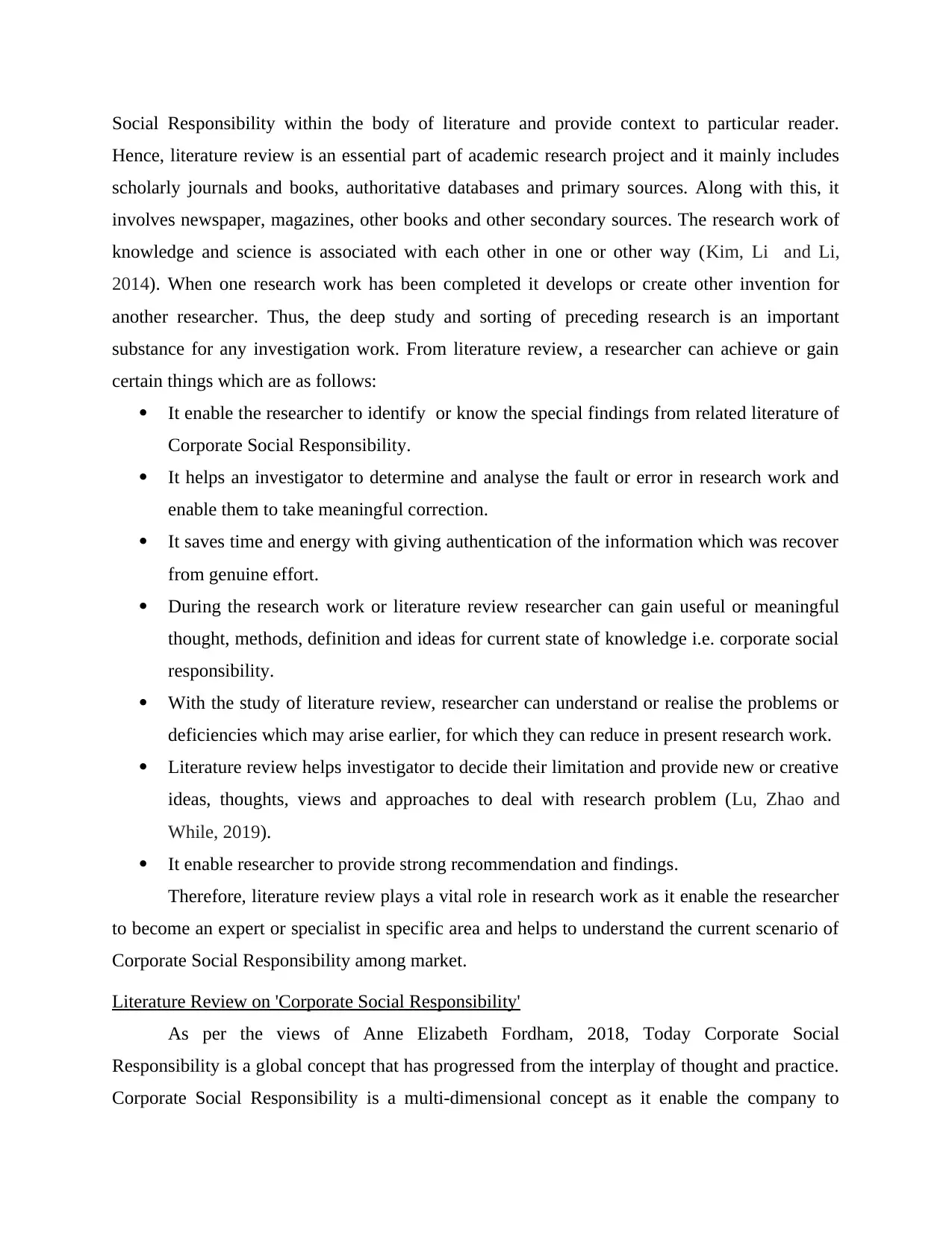
Social Responsibility within the body of literature and provide context to particular reader.
Hence, literature review is an essential part of academic research project and it mainly includes
scholarly journals and books, authoritative databases and primary sources. Along with this, it
involves newspaper, magazines, other books and other secondary sources. The research work of
knowledge and science is associated with each other in one or other way (Kim, Li and Li,
2014). When one research work has been completed it develops or create other invention for
another researcher. Thus, the deep study and sorting of preceding research is an important
substance for any investigation work. From literature review, a researcher can achieve or gain
certain things which are as follows:
It enable the researcher to identify or know the special findings from related literature of
Corporate Social Responsibility.
It helps an investigator to determine and analyse the fault or error in research work and
enable them to take meaningful correction.
It saves time and energy with giving authentication of the information which was recover
from genuine effort.
During the research work or literature review researcher can gain useful or meaningful
thought, methods, definition and ideas for current state of knowledge i.e. corporate social
responsibility.
With the study of literature review, researcher can understand or realise the problems or
deficiencies which may arise earlier, for which they can reduce in present research work.
Literature review helps investigator to decide their limitation and provide new or creative
ideas, thoughts, views and approaches to deal with research problem (Lu, Zhao and
While, 2019).
It enable researcher to provide strong recommendation and findings.
Therefore, literature review plays a vital role in research work as it enable the researcher
to become an expert or specialist in specific area and helps to understand the current scenario of
Corporate Social Responsibility among market.
Literature Review on 'Corporate Social Responsibility'
As per the views of Anne Elizabeth Fordham, 2018, Today Corporate Social
Responsibility is a global concept that has progressed from the interplay of thought and practice.
Corporate Social Responsibility is a multi-dimensional concept as it enable the company to
Hence, literature review is an essential part of academic research project and it mainly includes
scholarly journals and books, authoritative databases and primary sources. Along with this, it
involves newspaper, magazines, other books and other secondary sources. The research work of
knowledge and science is associated with each other in one or other way (Kim, Li and Li,
2014). When one research work has been completed it develops or create other invention for
another researcher. Thus, the deep study and sorting of preceding research is an important
substance for any investigation work. From literature review, a researcher can achieve or gain
certain things which are as follows:
It enable the researcher to identify or know the special findings from related literature of
Corporate Social Responsibility.
It helps an investigator to determine and analyse the fault or error in research work and
enable them to take meaningful correction.
It saves time and energy with giving authentication of the information which was recover
from genuine effort.
During the research work or literature review researcher can gain useful or meaningful
thought, methods, definition and ideas for current state of knowledge i.e. corporate social
responsibility.
With the study of literature review, researcher can understand or realise the problems or
deficiencies which may arise earlier, for which they can reduce in present research work.
Literature review helps investigator to decide their limitation and provide new or creative
ideas, thoughts, views and approaches to deal with research problem (Lu, Zhao and
While, 2019).
It enable researcher to provide strong recommendation and findings.
Therefore, literature review plays a vital role in research work as it enable the researcher
to become an expert or specialist in specific area and helps to understand the current scenario of
Corporate Social Responsibility among market.
Literature Review on 'Corporate Social Responsibility'
As per the views of Anne Elizabeth Fordham, 2018, Today Corporate Social
Responsibility is a global concept that has progressed from the interplay of thought and practice.
Corporate Social Responsibility is a multi-dimensional concept as it enable the company to
Paraphrase This Document
Need a fresh take? Get an instant paraphrase of this document with our AI Paraphraser
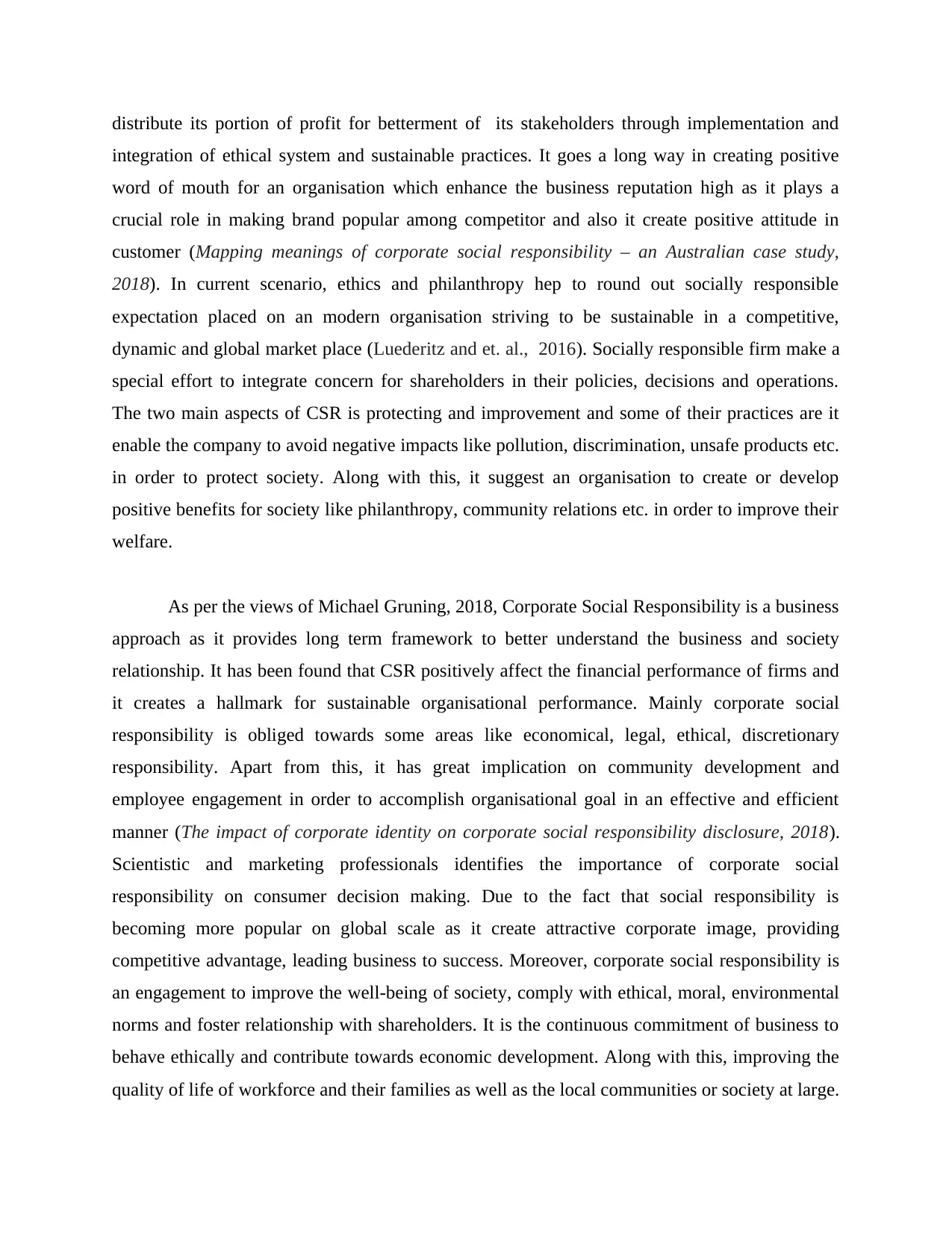
distribute its portion of profit for betterment of its stakeholders through implementation and
integration of ethical system and sustainable practices. It goes a long way in creating positive
word of mouth for an organisation which enhance the business reputation high as it plays a
crucial role in making brand popular among competitor and also it create positive attitude in
customer (Mapping meanings of corporate social responsibility – an Australian case study,
2018). In current scenario, ethics and philanthropy hep to round out socially responsible
expectation placed on an modern organisation striving to be sustainable in a competitive,
dynamic and global market place (Luederitz and et. al., 2016). Socially responsible firm make a
special effort to integrate concern for shareholders in their policies, decisions and operations.
The two main aspects of CSR is protecting and improvement and some of their practices are it
enable the company to avoid negative impacts like pollution, discrimination, unsafe products etc.
in order to protect society. Along with this, it suggest an organisation to create or develop
positive benefits for society like philanthropy, community relations etc. in order to improve their
welfare.
As per the views of Michael Gruning, 2018, Corporate Social Responsibility is a business
approach as it provides long term framework to better understand the business and society
relationship. It has been found that CSR positively affect the financial performance of firms and
it creates a hallmark for sustainable organisational performance. Mainly corporate social
responsibility is obliged towards some areas like economical, legal, ethical, discretionary
responsibility. Apart from this, it has great implication on community development and
employee engagement in order to accomplish organisational goal in an effective and efficient
manner (The impact of corporate identity on corporate social responsibility disclosure, 2018).
Scientistic and marketing professionals identifies the importance of corporate social
responsibility on consumer decision making. Due to the fact that social responsibility is
becoming more popular on global scale as it create attractive corporate image, providing
competitive advantage, leading business to success. Moreover, corporate social responsibility is
an engagement to improve the well-being of society, comply with ethical, moral, environmental
norms and foster relationship with shareholders. It is the continuous commitment of business to
behave ethically and contribute towards economic development. Along with this, improving the
quality of life of workforce and their families as well as the local communities or society at large.
integration of ethical system and sustainable practices. It goes a long way in creating positive
word of mouth for an organisation which enhance the business reputation high as it plays a
crucial role in making brand popular among competitor and also it create positive attitude in
customer (Mapping meanings of corporate social responsibility – an Australian case study,
2018). In current scenario, ethics and philanthropy hep to round out socially responsible
expectation placed on an modern organisation striving to be sustainable in a competitive,
dynamic and global market place (Luederitz and et. al., 2016). Socially responsible firm make a
special effort to integrate concern for shareholders in their policies, decisions and operations.
The two main aspects of CSR is protecting and improvement and some of their practices are it
enable the company to avoid negative impacts like pollution, discrimination, unsafe products etc.
in order to protect society. Along with this, it suggest an organisation to create or develop
positive benefits for society like philanthropy, community relations etc. in order to improve their
welfare.
As per the views of Michael Gruning, 2018, Corporate Social Responsibility is a business
approach as it provides long term framework to better understand the business and society
relationship. It has been found that CSR positively affect the financial performance of firms and
it creates a hallmark for sustainable organisational performance. Mainly corporate social
responsibility is obliged towards some areas like economical, legal, ethical, discretionary
responsibility. Apart from this, it has great implication on community development and
employee engagement in order to accomplish organisational goal in an effective and efficient
manner (The impact of corporate identity on corporate social responsibility disclosure, 2018).
Scientistic and marketing professionals identifies the importance of corporate social
responsibility on consumer decision making. Due to the fact that social responsibility is
becoming more popular on global scale as it create attractive corporate image, providing
competitive advantage, leading business to success. Moreover, corporate social responsibility is
an engagement to improve the well-being of society, comply with ethical, moral, environmental
norms and foster relationship with shareholders. It is the continuous commitment of business to
behave ethically and contribute towards economic development. Along with this, improving the
quality of life of workforce and their families as well as the local communities or society at large.
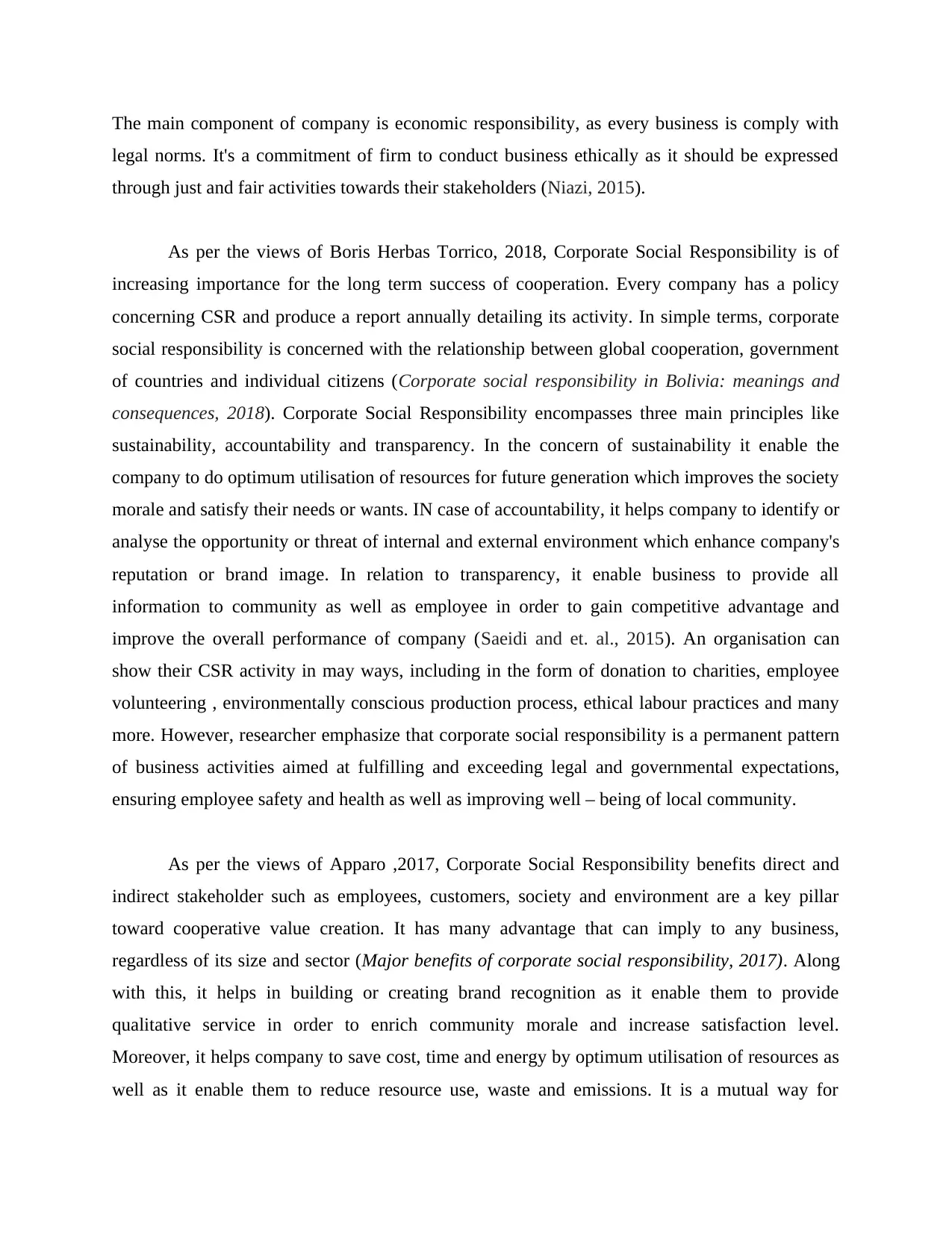
The main component of company is economic responsibility, as every business is comply with
legal norms. It's a commitment of firm to conduct business ethically as it should be expressed
through just and fair activities towards their stakeholders (Niazi, 2015).
As per the views of Boris Herbas Torrico, 2018, Corporate Social Responsibility is of
increasing importance for the long term success of cooperation. Every company has a policy
concerning CSR and produce a report annually detailing its activity. In simple terms, corporate
social responsibility is concerned with the relationship between global cooperation, government
of countries and individual citizens (Corporate social responsibility in Bolivia: meanings and
consequences, 2018). Corporate Social Responsibility encompasses three main principles like
sustainability, accountability and transparency. In the concern of sustainability it enable the
company to do optimum utilisation of resources for future generation which improves the society
morale and satisfy their needs or wants. IN case of accountability, it helps company to identify or
analyse the opportunity or threat of internal and external environment which enhance company's
reputation or brand image. In relation to transparency, it enable business to provide all
information to community as well as employee in order to gain competitive advantage and
improve the overall performance of company (Saeidi and et. al., 2015). An organisation can
show their CSR activity in may ways, including in the form of donation to charities, employee
volunteering , environmentally conscious production process, ethical labour practices and many
more. However, researcher emphasize that corporate social responsibility is a permanent pattern
of business activities aimed at fulfilling and exceeding legal and governmental expectations,
ensuring employee safety and health as well as improving well – being of local community.
As per the views of Apparo ,2017, Corporate Social Responsibility benefits direct and
indirect stakeholder such as employees, customers, society and environment are a key pillar
toward cooperative value creation. It has many advantage that can imply to any business,
regardless of its size and sector (Major benefits of corporate social responsibility, 2017). Along
with this, it helps in building or creating brand recognition as it enable them to provide
qualitative service in order to enrich community morale and increase satisfaction level.
Moreover, it helps company to save cost, time and energy by optimum utilisation of resources as
well as it enable them to reduce resource use, waste and emissions. It is a mutual way for
legal norms. It's a commitment of firm to conduct business ethically as it should be expressed
through just and fair activities towards their stakeholders (Niazi, 2015).
As per the views of Boris Herbas Torrico, 2018, Corporate Social Responsibility is of
increasing importance for the long term success of cooperation. Every company has a policy
concerning CSR and produce a report annually detailing its activity. In simple terms, corporate
social responsibility is concerned with the relationship between global cooperation, government
of countries and individual citizens (Corporate social responsibility in Bolivia: meanings and
consequences, 2018). Corporate Social Responsibility encompasses three main principles like
sustainability, accountability and transparency. In the concern of sustainability it enable the
company to do optimum utilisation of resources for future generation which improves the society
morale and satisfy their needs or wants. IN case of accountability, it helps company to identify or
analyse the opportunity or threat of internal and external environment which enhance company's
reputation or brand image. In relation to transparency, it enable business to provide all
information to community as well as employee in order to gain competitive advantage and
improve the overall performance of company (Saeidi and et. al., 2015). An organisation can
show their CSR activity in may ways, including in the form of donation to charities, employee
volunteering , environmentally conscious production process, ethical labour practices and many
more. However, researcher emphasize that corporate social responsibility is a permanent pattern
of business activities aimed at fulfilling and exceeding legal and governmental expectations,
ensuring employee safety and health as well as improving well – being of local community.
As per the views of Apparo ,2017, Corporate Social Responsibility benefits direct and
indirect stakeholder such as employees, customers, society and environment are a key pillar
toward cooperative value creation. It has many advantage that can imply to any business,
regardless of its size and sector (Major benefits of corporate social responsibility, 2017). Along
with this, it helps in building or creating brand recognition as it enable them to provide
qualitative service in order to enrich community morale and increase satisfaction level.
Moreover, it helps company to save cost, time and energy by optimum utilisation of resources as
well as it enable them to reduce resource use, waste and emissions. It is a mutual way for
⊘ This is a preview!⊘
Do you want full access?
Subscribe today to unlock all pages.

Trusted by 1+ million students worldwide
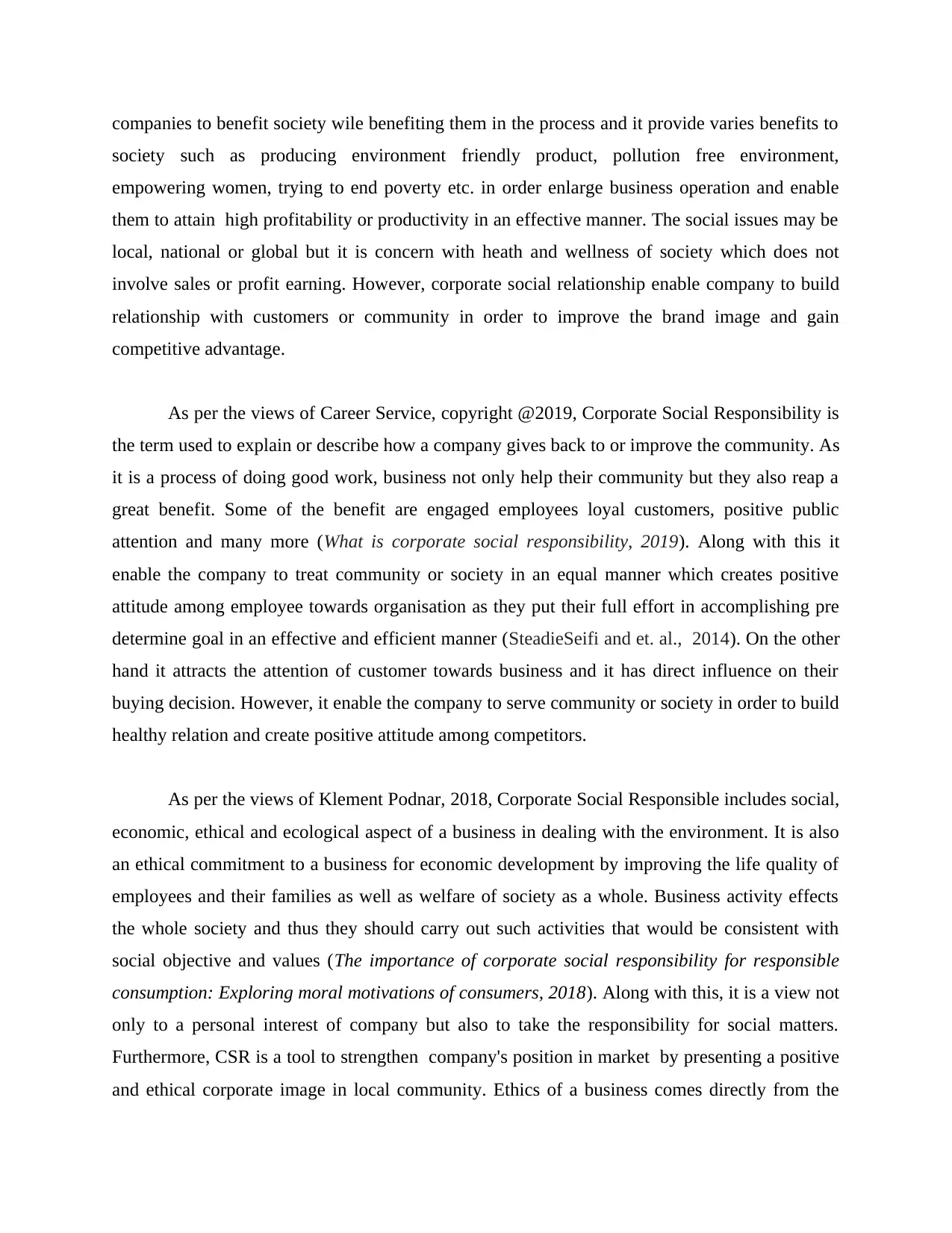
companies to benefit society wile benefiting them in the process and it provide varies benefits to
society such as producing environment friendly product, pollution free environment,
empowering women, trying to end poverty etc. in order enlarge business operation and enable
them to attain high profitability or productivity in an effective manner. The social issues may be
local, national or global but it is concern with heath and wellness of society which does not
involve sales or profit earning. However, corporate social relationship enable company to build
relationship with customers or community in order to improve the brand image and gain
competitive advantage.
As per the views of Career Service, copyright @2019, Corporate Social Responsibility is
the term used to explain or describe how a company gives back to or improve the community. As
it is a process of doing good work, business not only help their community but they also reap a
great benefit. Some of the benefit are engaged employees loyal customers, positive public
attention and many more (What is corporate social responsibility, 2019). Along with this it
enable the company to treat community or society in an equal manner which creates positive
attitude among employee towards organisation as they put their full effort in accomplishing pre
determine goal in an effective and efficient manner (SteadieSeifi and et. al., 2014). On the other
hand it attracts the attention of customer towards business and it has direct influence on their
buying decision. However, it enable the company to serve community or society in order to build
healthy relation and create positive attitude among competitors.
As per the views of Klement Podnar, 2018, Corporate Social Responsible includes social,
economic, ethical and ecological aspect of a business in dealing with the environment. It is also
an ethical commitment to a business for economic development by improving the life quality of
employees and their families as well as welfare of society as a whole. Business activity effects
the whole society and thus they should carry out such activities that would be consistent with
social objective and values (The importance of corporate social responsibility for responsible
consumption: Exploring moral motivations of consumers, 2018). Along with this, it is a view not
only to a personal interest of company but also to take the responsibility for social matters.
Furthermore, CSR is a tool to strengthen company's position in market by presenting a positive
and ethical corporate image in local community. Ethics of a business comes directly from the
society such as producing environment friendly product, pollution free environment,
empowering women, trying to end poverty etc. in order enlarge business operation and enable
them to attain high profitability or productivity in an effective manner. The social issues may be
local, national or global but it is concern with heath and wellness of society which does not
involve sales or profit earning. However, corporate social relationship enable company to build
relationship with customers or community in order to improve the brand image and gain
competitive advantage.
As per the views of Career Service, copyright @2019, Corporate Social Responsibility is
the term used to explain or describe how a company gives back to or improve the community. As
it is a process of doing good work, business not only help their community but they also reap a
great benefit. Some of the benefit are engaged employees loyal customers, positive public
attention and many more (What is corporate social responsibility, 2019). Along with this it
enable the company to treat community or society in an equal manner which creates positive
attitude among employee towards organisation as they put their full effort in accomplishing pre
determine goal in an effective and efficient manner (SteadieSeifi and et. al., 2014). On the other
hand it attracts the attention of customer towards business and it has direct influence on their
buying decision. However, it enable the company to serve community or society in order to build
healthy relation and create positive attitude among competitors.
As per the views of Klement Podnar, 2018, Corporate Social Responsible includes social,
economic, ethical and ecological aspect of a business in dealing with the environment. It is also
an ethical commitment to a business for economic development by improving the life quality of
employees and their families as well as welfare of society as a whole. Business activity effects
the whole society and thus they should carry out such activities that would be consistent with
social objective and values (The importance of corporate social responsibility for responsible
consumption: Exploring moral motivations of consumers, 2018). Along with this, it is a view not
only to a personal interest of company but also to take the responsibility for social matters.
Furthermore, CSR is a tool to strengthen company's position in market by presenting a positive
and ethical corporate image in local community. Ethics of a business comes directly from the
Paraphrase This Document
Need a fresh take? Get an instant paraphrase of this document with our AI Paraphraser
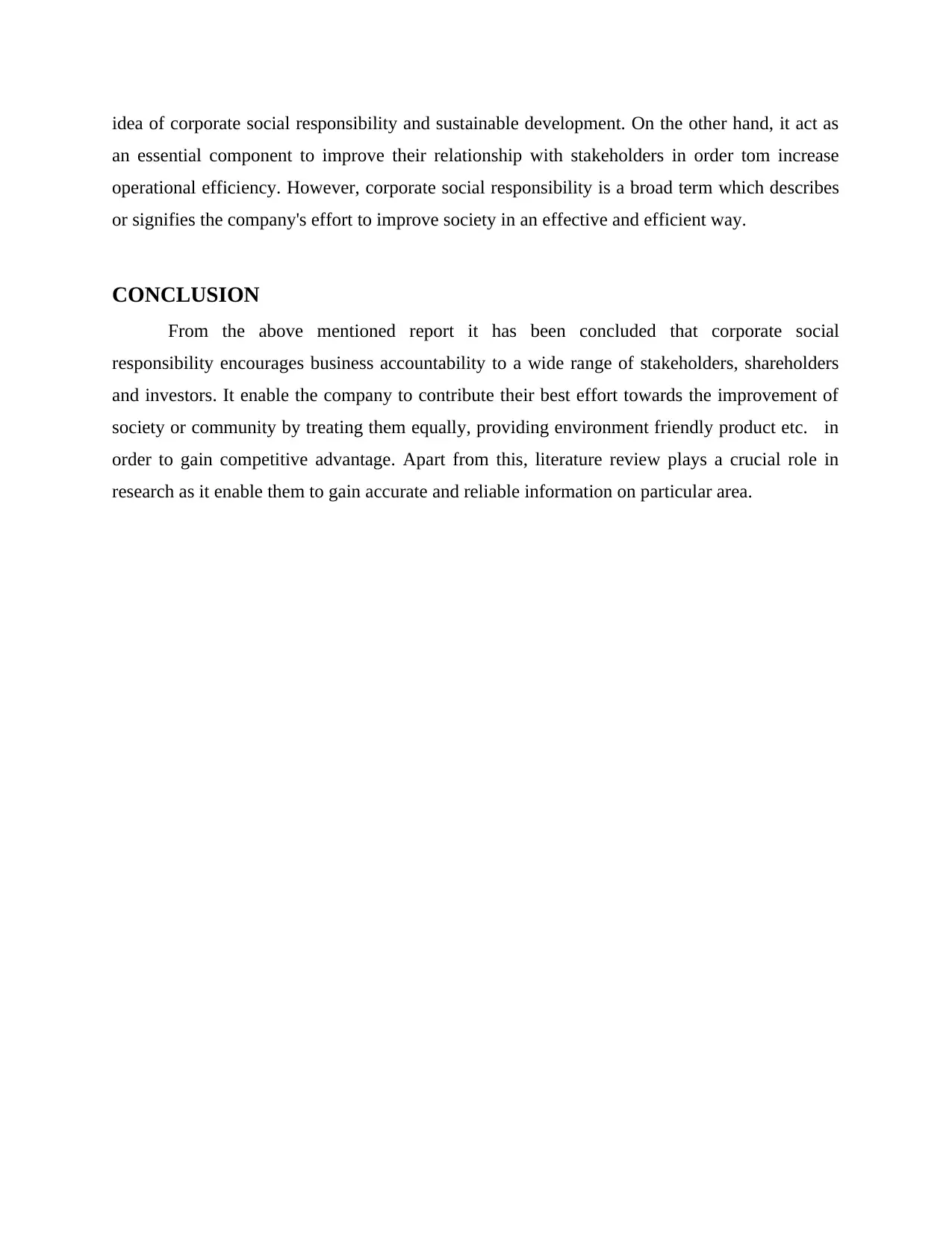
idea of corporate social responsibility and sustainable development. On the other hand, it act as
an essential component to improve their relationship with stakeholders in order tom increase
operational efficiency. However, corporate social responsibility is a broad term which describes
or signifies the company's effort to improve society in an effective and efficient way.
CONCLUSION
From the above mentioned report it has been concluded that corporate social
responsibility encourages business accountability to a wide range of stakeholders, shareholders
and investors. It enable the company to contribute their best effort towards the improvement of
society or community by treating them equally, providing environment friendly product etc. in
order to gain competitive advantage. Apart from this, literature review plays a crucial role in
research as it enable them to gain accurate and reliable information on particular area.
an essential component to improve their relationship with stakeholders in order tom increase
operational efficiency. However, corporate social responsibility is a broad term which describes
or signifies the company's effort to improve society in an effective and efficient way.
CONCLUSION
From the above mentioned report it has been concluded that corporate social
responsibility encourages business accountability to a wide range of stakeholders, shareholders
and investors. It enable the company to contribute their best effort towards the improvement of
society or community by treating them equally, providing environment friendly product etc. in
order to gain competitive advantage. Apart from this, literature review plays a crucial role in
research as it enable them to gain accurate and reliable information on particular area.
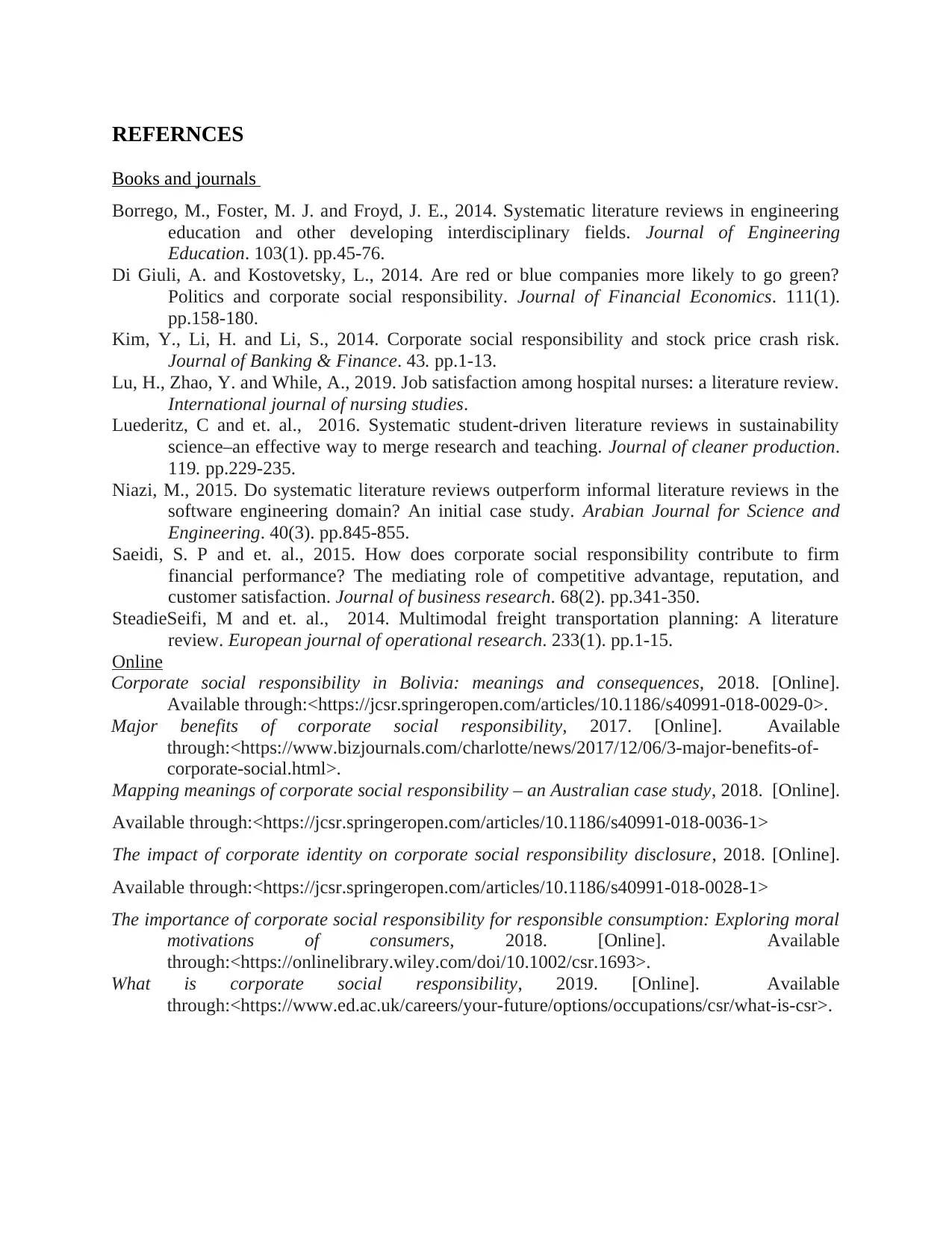
REFERNCES
Books and journals
Borrego, M., Foster, M. J. and Froyd, J. E., 2014. Systematic literature reviews in engineering
education and other developing interdisciplinary fields. Journal of Engineering
Education. 103(1). pp.45-76.
Di Giuli, A. and Kostovetsky, L., 2014. Are red or blue companies more likely to go green?
Politics and corporate social responsibility. Journal of Financial Economics. 111(1).
pp.158-180.
Kim, Y., Li, H. and Li, S., 2014. Corporate social responsibility and stock price crash risk.
Journal of Banking & Finance. 43. pp.1-13.
Lu, H., Zhao, Y. and While, A., 2019. Job satisfaction among hospital nurses: a literature review.
International journal of nursing studies.
Luederitz, C and et. al., 2016. Systematic student-driven literature reviews in sustainability
science–an effective way to merge research and teaching. Journal of cleaner production.
119. pp.229-235.
Niazi, M., 2015. Do systematic literature reviews outperform informal literature reviews in the
software engineering domain? An initial case study. Arabian Journal for Science and
Engineering. 40(3). pp.845-855.
Saeidi, S. P and et. al., 2015. How does corporate social responsibility contribute to firm
financial performance? The mediating role of competitive advantage, reputation, and
customer satisfaction. Journal of business research. 68(2). pp.341-350.
SteadieSeifi, M and et. al., 2014. Multimodal freight transportation planning: A literature
review. European journal of operational research. 233(1). pp.1-15.
Online
Corporate social responsibility in Bolivia: meanings and consequences, 2018. [Online].
Available through:<https://jcsr.springeropen.com/articles/10.1186/s40991-018-0029-0>.
Major benefits of corporate social responsibility, 2017. [Online]. Available
through:<https://www.bizjournals.com/charlotte/news/2017/12/06/3-major-benefits-of-
corporate-social.html>.
Mapping meanings of corporate social responsibility – an Australian case study, 2018. [Online].
Available through:<https://jcsr.springeropen.com/articles/10.1186/s40991-018-0036-1>
The impact of corporate identity on corporate social responsibility disclosure, 2018. [Online].
Available through:<https://jcsr.springeropen.com/articles/10.1186/s40991-018-0028-1>
The importance of corporate social responsibility for responsible consumption: Exploring moral
motivations of consumers, 2018. [Online]. Available
through:<https://onlinelibrary.wiley.com/doi/10.1002/csr.1693>.
What is corporate social responsibility, 2019. [Online]. Available
through:<https://www.ed.ac.uk/careers/your-future/options/occupations/csr/what-is-csr>.
Books and journals
Borrego, M., Foster, M. J. and Froyd, J. E., 2014. Systematic literature reviews in engineering
education and other developing interdisciplinary fields. Journal of Engineering
Education. 103(1). pp.45-76.
Di Giuli, A. and Kostovetsky, L., 2014. Are red or blue companies more likely to go green?
Politics and corporate social responsibility. Journal of Financial Economics. 111(1).
pp.158-180.
Kim, Y., Li, H. and Li, S., 2014. Corporate social responsibility and stock price crash risk.
Journal of Banking & Finance. 43. pp.1-13.
Lu, H., Zhao, Y. and While, A., 2019. Job satisfaction among hospital nurses: a literature review.
International journal of nursing studies.
Luederitz, C and et. al., 2016. Systematic student-driven literature reviews in sustainability
science–an effective way to merge research and teaching. Journal of cleaner production.
119. pp.229-235.
Niazi, M., 2015. Do systematic literature reviews outperform informal literature reviews in the
software engineering domain? An initial case study. Arabian Journal for Science and
Engineering. 40(3). pp.845-855.
Saeidi, S. P and et. al., 2015. How does corporate social responsibility contribute to firm
financial performance? The mediating role of competitive advantage, reputation, and
customer satisfaction. Journal of business research. 68(2). pp.341-350.
SteadieSeifi, M and et. al., 2014. Multimodal freight transportation planning: A literature
review. European journal of operational research. 233(1). pp.1-15.
Online
Corporate social responsibility in Bolivia: meanings and consequences, 2018. [Online].
Available through:<https://jcsr.springeropen.com/articles/10.1186/s40991-018-0029-0>.
Major benefits of corporate social responsibility, 2017. [Online]. Available
through:<https://www.bizjournals.com/charlotte/news/2017/12/06/3-major-benefits-of-
corporate-social.html>.
Mapping meanings of corporate social responsibility – an Australian case study, 2018. [Online].
Available through:<https://jcsr.springeropen.com/articles/10.1186/s40991-018-0036-1>
The impact of corporate identity on corporate social responsibility disclosure, 2018. [Online].
Available through:<https://jcsr.springeropen.com/articles/10.1186/s40991-018-0028-1>
The importance of corporate social responsibility for responsible consumption: Exploring moral
motivations of consumers, 2018. [Online]. Available
through:<https://onlinelibrary.wiley.com/doi/10.1002/csr.1693>.
What is corporate social responsibility, 2019. [Online]. Available
through:<https://www.ed.ac.uk/careers/your-future/options/occupations/csr/what-is-csr>.
⊘ This is a preview!⊘
Do you want full access?
Subscribe today to unlock all pages.

Trusted by 1+ million students worldwide

1 out of 10
Related Documents
Your All-in-One AI-Powered Toolkit for Academic Success.
+13062052269
info@desklib.com
Available 24*7 on WhatsApp / Email
![[object Object]](/_next/static/media/star-bottom.7253800d.svg)
Unlock your academic potential
Copyright © 2020–2026 A2Z Services. All Rights Reserved. Developed and managed by ZUCOL.





